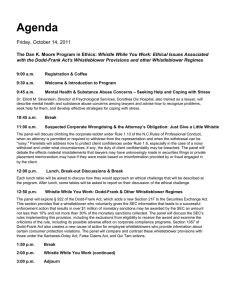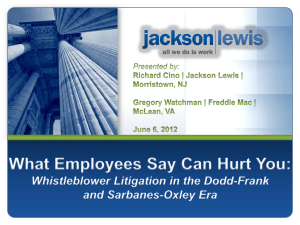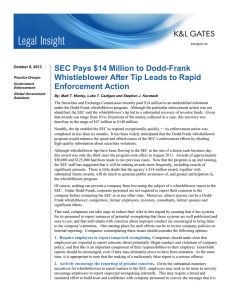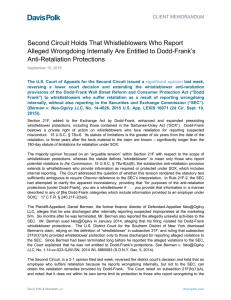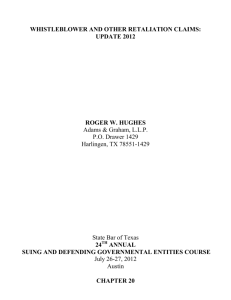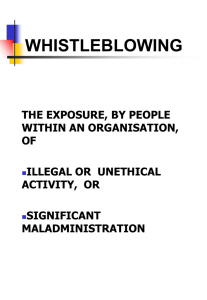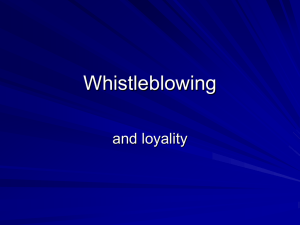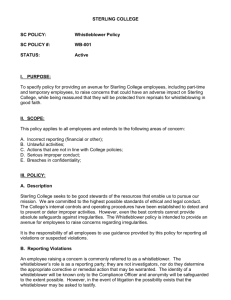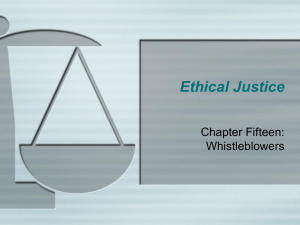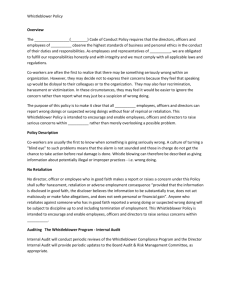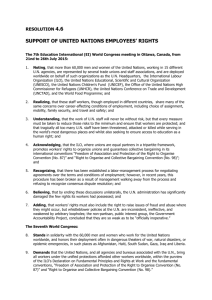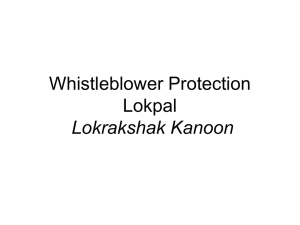Lawson - Association of Corporate Counsel
advertisement
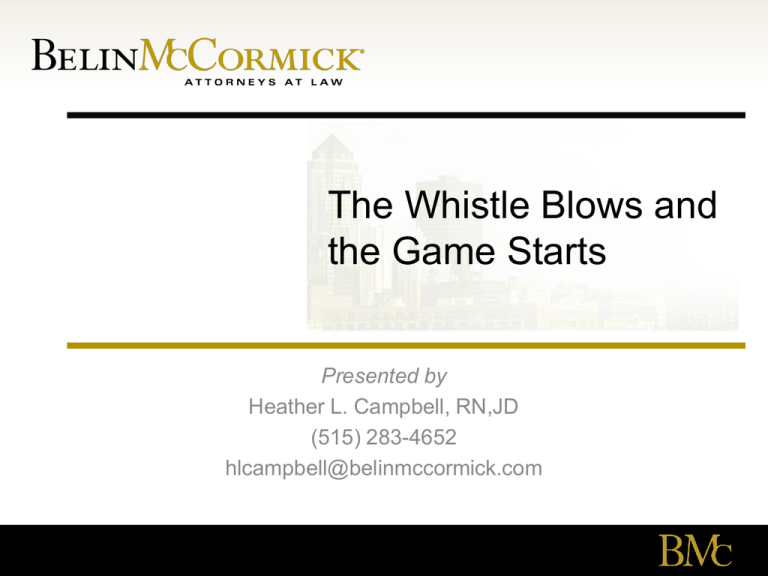
The Whistle Blows and the Game Starts Presented by Heather L. Campbell, RN,JD (515) 283-4652 hlcampbell@belinmccormick.com Current Landscape • Federal • SEC has an “Office of the Whistleblower” • DOJ reports 713 whistleblower cases under False Claims Act in FY 2014 • Billions in recoveries • FY2014 False Claims Act-$5.69 Billion; $435 Million to whistleblowers • SEC-3,620 tips in FY2014; 9 awards in 2014; 3 already in 2015; largest single award to date-$30 Million in 2014 • State agencies and joint federal/state agencies are also increasing enforcement • • © Attorney General’s Office Medicaid Fraud Control Unit (MFCU) Sarbanes Oxley and Lawson • Section 806 of Sarbanes-Oxley contains a whistleblower provision • “Civil Action to protect against retaliation in fraud cases” • “Whistleblower Protection for Employees of Publicly Traded Companies” Lawson-Facts • Fidelity mutual funds at issue • The mutual funds themselves had no employees, but instead contracted with privately held companies to handle day-today operations, including filings with SEC • Plaintiffs were employees of two privately held companies that contracted with Fidelity for management of operations of the funds Lawson-Facts and Procedure • One Plaintiff was Senior Director of Finance at her company and raised concerns about cost accounting methods she believed overstated expenses associated with operating the funds. Allegation was that after she suffered a series of adverse employment actions following, resulting in constructive discharge • Second Plaintiff was a portfolio manager and alleged he was fired in retaliation for raising concerns about inaccuracies in a draft SEC registration statement involving certain Fidelity funds. • Each filed administrative complaints and after the end of the 180day period specified in the statute, sued in federal district court in Massachusetts • Fidelity defendants moved to dismiss, arguing that § 1514A didn’t apply to Plaintiffs because they were not employees of a public company (the fund itself), so the public company took no adverse action against the employees Lawson-Procedure • District Court denied motion to dismiss • Divided panel of First Circuit COA reversedmajority held that “an employee” meant only employees of public companies and not the employees and not a contractor’s own employees • Administrative Review Board later issued Spinner decision, in which it stated that §1514A affords whistleblower protection to employees of privately held contractors that render services to public companies • Supreme Court granted certiorari to resolve the division of opinion Lawson-SCOTUS Majority • Ordinary meaning- “no …contractor…may discharge…an employee” • No insertion “of a public company” should be read into the statute; where Congress meant “an employee of a public company, it said so” • Who else would contractor have authority to fire-likely not the employee of the public company with whom it contracts; that interpretation would “shrink to insignificance the provision’s ban on retaliation by contractors” • Congressional intent to ward off another Enron debacle • Dismissed the captions as not dispositive, as text was not ambiguous • Scalia and Thomas-concur in principal part and in judgment- text is plain “employee” means employee of a contractor, so no need to discuss Congressional intent Lawson-Dissent • Sotomayor, Kennedy and Alito • Statute speaks to public companies and then to five types of representatives companies hire to carry out their business • Capable of interpretation either way-but majority’s interpretation goes too far as it would include household employees of any individual who works for Section 12 or Section 15(d) company; • Look at headings for guidance Dodd-Frank and FCPA • 15 U.S.C. § 78u-6(h)(1)(A) prohibits employers from retaliating against a whistleblower for: • Providing information to the SEC; • Initiating, testifying in, or assisting in any investigation or judicial or administrative action of the SEC based upon or related to such information; or • Making disclosure that are required or protected under SOX, certain other securities law, and any other law, rule or regulation subject to the jurisdiction of the SEC • Allows for civil action in court, reinstatement, twotimes back pay and attorneys fees Dodd-Frank and FCPA • SEC stated it expects FCPA complaints under Dodd-Frank whistleblower provisions to continue to be “increasingly fertile ground” • Unless you aren’t in the U.S.• Liu- District Court held, and Second Circuit affirmed, that Dodd-Frank whistleblower provisions did not apply to foreign nationals employed by foreign companies abroad (Liu v. Siemens AG, No. 13-4385cv) • Presumption against extraterritorial application • Facts-no conduct happened in US-all overseas; question whether different facts would have changed the outcome? Dodd-Frank and FCPA • Also cases addressing whether internal reporting alone is sufficient to trigger whistleblower and anti-retaliation provisions • Some district courts have ruled that a whistleblower need not report to directly to the SEC, a position the agency advocates • The Fifth Circuit has ruled that to be a whistleblower under Dodd-Frank, an employee must actually provide information to the SEC (Asadi v. GE Energy, No.12-20522) • Eighth Circuit recently declined to hear an interlocutory appeal of a Nebraska District Court Judge’s denial of a motion to dismiss on the basis that the plaintiff was not a whistleblower under the act because she did not directly report alleged fraud to the SEC, but instead to reported to FINRA False Claims Act • 31 U.S.C. § 3729 • Violations result from knowingly: • Presenting or causing the presentation of a false claim or fraudulent claim for payment or approval to an officer or employee of the United State government or a member of the Armed Forces of the United States; • Making, using or causing to be made or used, a false record or statement material to a false or fraudulent claim; • Avoiding or decreasing a payment “obligation” • For providers enrolled in federal health care programs, failing to report and return overpayments (ACA 6402(d)) • “Knowingly”: actual awareness of falsity; deliberate ignorance of the truth or falsity; or reckless disregard of truth or falsity FCA-Whistleblower Provision • 31 U.S.C § 3730 • United States or private qui tam relators may bring civil fraud actions • Up to $11,000 per claim, trebled, attorney fees, costs • Requires whistleblower to be “original source” • If successful, whistleblower gets between 15-30% of the recovery, plus costs • Also contains an anti-retaliation provision for employees that provides for reinstatement with same seniority, two times back pay, interest on back pay, special damages, fees and costs Iowa False Claims Act • • • • Iowa Code Chapter 685 Enacted July 1, 2010, amended July 1, 2011 Largely mirrors Federal False Claims Act Few known cases • First case filed in 2013 by Attorney General • Recent intervention of AG in unsealed qui tam case filed by former employee • Both are based on allegations of Medicaid fraud If Only It Were That Simple… Climate • Significant incentives for current and former employees to blow the whistle • Employer may not know that current or former employee or employee has filed a qui tam action • Even those that aren’t filed as qui tam actions can be expensive to defend and settle with regulators • Post-Lawson, clear that contractors and their employees must be addressed Compliance and Reporting • Review compliance and reporting policies and procedures • Clear, unambiguous policies and procedures • Coverage of contractors and their employees • Process for ensuring appropriate dissemination and documentation of understanding • Agreements with contractors should contain strong language concerning compliance issues, including specific information on the contact for internal reporting Confidentiality Provisions • SEC recently charged a Houston-based technology and engineering firm with violating Rule 21F-17, which prohibits companies from taking any action to impede whistleblowers from reporting possible securities laws violations to the SEC • At issue was a requirement that witnesses in certain internal investigations not discuss the matters with outside parties without the approval of the company’s in-house legal department or the employee could be subject to discipline, including termination • SEC stated provisions in agreements such as the one at issue could silence potential whistleblowers and the agency will “vigorously enforce” the rules prohibiting them • Can seek to maintain attorney-client privileged information so role of counsel in conducting investigative interviews should be considered • Settled for $130,000 and a change in the policies and agreements Okay, we get it… No, BUT Internal Reporting is Goal • Initial and ongoing training on employee’s obligation to report compliance issues internally • All employees and contractors get initial training on company’s compliance and reporting procedures • Annual update-reminder and update if changes • Culture that not only encourages but requires internal reporting (can’t preclude external) Documentation • Document all training provided-who attended, when, what was covered, keep a copy of materials for your file • Annual compliance disclosure form • In conjunction with annual training, require employees/contractors to disclose any compliance issues of which they are aware • Includes request for description of issue, whether it was reported internally or externally, to whom, etc. • If employee or contractor doesn’t disclose anything, can be good evidence in later proceeding(s) Investigations • Investigations • Litigation Hold-immediately communicate need to preserve relevant evidence • Employee interviews • Get investigative interviews done quickly, as employee turnover can lead to challenges later if an external investigation or a lawsuit is initiated • Be sure to consider issues like Upjohn warnings Okay, now we really get it… Post-Investigation Disciplinary Action • Cannot retaliate against individuals who complain, whether internally or externally, about compliance issues • Just because an employee has made an internal or external complaint doesn’t mean you can’t take disciplinary action for something unrelated • However, it can be very risky so make sure you have good documentation • Another reason to do honest employee evaluations and continually evaluate; sometimes timing is a factor and employer is “stuck” because there are legitimate performance issues, but those issues aren’t documented or are poorly documented, leading to inference of action as retaliation for report Post-Investigation Disciplinary Action • If employer becomes aware of activity that is potentially fraudulent, take disciplinary action quickly and document, document, document • Accounts in disciplinary actions should be factual, not conclusory in nature • Becomes unwelcome exhibit in unemployment hearings and other proceedings • Disciplinary actions for failure to report • Sends a strong message of compliance and obligation to report • Document, document, document • Makes current employee former employee=more incentive to externally report? • Really depends on number of factors Post-Investigation Actions • Synthesize interview notes, facts, and reach conclusion on whether alleged conduct did in fact occur, and if so, whether it violated the employer’s policies and/or a law • Consider whether employment action(s) will be takenafter consulting with experienced counsel • If legal violation, consider self-disclosure after consulting with experienced counsel • Often, carefully thought-out self-disclosure results in quicker resolution with less financial and reputational risk • CAVEAT: NOT ALWAYS!!! • May also eliminate “original source” component of some whistleblower requirements Conclusion • Whistleblower claims increasing with several sources of law for complaints • Review compliance reporting policies and procedures • When faced with internal report or external investigation, move quickly but deliberately • • • • Interview employees and witnesses Preserve evidence Synthesize findings Take appropriate action-self-disclosure, disciplinary action Questions? • Thank you
